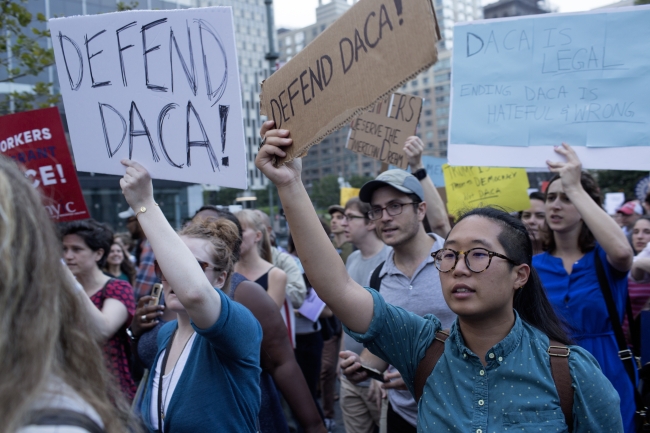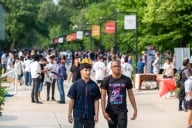You have /5 articles left.
Sign up for a free account or log in.

DACA supporters protest.
Getty Images
Where do we go from here? Having exhausted the vocabulary of outrage in reaction to the contemptible decision of the Trump administration to rescind the Deferred Action for Childhood Arrivals programs, or DACA -- albeit with a six-month window daring Congress to come up with legislation to save the day for Dreamers -- we now must turn anger into action to ensure the right outcome for our students and undocumented persons throughout the United States.
With more than 100 undocumented students enrolled at my university, Trinity in Washington, I have a clear interest in making sure that Congress achieves a legislative solution quickly. But for higher education, the issues go well beyond caring for the thousands of Dreamers collectively enrolled in our institutions. This is a moment when college and university leaders must be advocates and activists to affirm some of the most fundamental values of our national commitment to equity and justice for all people.
Make no mistake about it: what the Trump administration, through Attorney General Jeff Sessions, said about Dreamers is utterly reprehensible. He used the ugly slur “illegal aliens,” a phrase that conveys profound contempt for the human beings whose lives are at stake. The context in which he used the slur is even worse: Sessions claimed that DACA “denied jobs to hundreds of thousands of Americans by allowing those same jobs to go to illegal aliens.” That is just not true, and the repetition of this Trump campaign canard is the classic dog whistle to the Trump base that sees immigration as a zero-sum game. Dreamers are not taking jobs away from American citizens. It’s a cheap shot to blame them for the educational and sociological problems that cause some Americans to be underemployed.
Sessions also claimed that DACA gave undocumented young people “executive amnesty,” which is also highly questionable. As the name makes clear, the program only deferred action, rather than conveying any permanent status. President Obama approved the program as a temporary response to the protracted problem of congressional inability to address immigration more systematically.
Knowing the dysfunction of the current Congress and its inability in prior congressional sessions to enact immigration legislation, the manner in which the Trump administration has chosen to put Dreamers at risk of losing the modest protection of DACA is emotionally cruel, leaving them exposed to the uncertainty of the legislative process and the manipulative deal making of congressional leaders. Using the lives of young people as bargaining chips to trade for border wall funds or other political wish list items is despicable.
Nevertheless, here we are, and the urgent needs of our students require immediate actions to alleviate the human crisis the Trump administration’s rollback of DACA has created.
Our top priority is to care for our students in every way possible. To do this, we must know who they are. I’ve been surprised to hear some college and university presidents say that they don’t know who their Dreamers are and they don’t want to know -- not to be heartless, but protective. But ignorance is an ineffective shield from harmful governmental action. We can certainly protect our undocumented students from public exposure, although some are quite courageous in being willing to tell their stories and stand up as public advocates. We surely must protect their private information in the same ways we protect all student information.
What Dreamers really need right now is someone to talk to, people with the capacity on campus to hear their stories and concerns and to be responsive to them. They don’t expect us to have all the answers, but they do need a framework for responding to the current threats to their livelihood, academic status, personal security and family support. They welcome knowing that their administrators and faculty members are their advocates, and that there’s a support system on the campus to respond to their needs.
For some, that support system might be as simple as academic advisers who are able to listen sympathetically, the availability of health services to support their physical and emotional needs, or emergency funds for food and transportation. For others, a support system might include connecting them to immigration legal services or knowing what kinds of concerns they have about families, children and employers. They want to know that their grants and scholarships are secure. They want to know what the institution will do if U.S. Immigration and Customs Enforcement shows up, a legitimate concern. They want to know if we’ll be able to help if they lose their work permits, a difficult but necessary financial question that we need to figure out.
While caring for our Dreamers, we cannot forget our other students. Three weeks ago, we were reeling from Charlottesville and the terrifying sight of white supremacists marching across the University of Virginia lawn bearing deep racial hatred along with their tiki torches. The issues converge: whether undocumented students or African-American or Asian or Latino students, the deep American disorder of racial and ethnic hatred afflicts our campus families as much as the larger community. We cannot prefer one over another; rather, in addressing the issues, we need to bring everyone on our campuses into the discussion and development of effective responses to the hatred, fear and stress our students are feeling at this ugly moment in American history.
Even as we care for our students, as academics we also need to stand up for the truth. This is precisely the place where teaching intersects with advocacy, and we cannot shrink from that responsibility. When a public official uses a slur -- “illegal aliens” -- we must confront this offense against human dignity. When a public official makes a statement to justify policy that has no basis in fact -- Dreamers are taking American jobs, e.g. -- we need to call it out and state the facts. Colleges and universities must be the bulwark in our society against official assaults on truth.
We should be fearless in confronting issues of law and human rights. We can and should challenge the Trump administration’s narrative that the rescission of DACA is a “compassionate” end to “lawlessness.” Whether DACA was an appropriate exercise of executive authority is an interesting legal debate, but the plain fact remains that the United States provided a legitimate form of humanitarian relief to Dreamers that should not be removed abruptly for political reasons. Newark Cardinal Joseph Tobin said it best this week: “One can’t hide behind the term ‘legality’ in rescinding DACA. That is an abandonment of humanity, and abandonment of talented and hopeful young people who are as American as you and I. The rule of law, first, last and always, must provide a humane, moral code to organize, protect and advance society based on the best ideals and beliefs in our hearts and minds.”
Finally, we need to get an effective legislative solution and fast. To get the right result in Congress, higher education should consider doing something we rarely do -- join forces across industries and social organizations to let Congress know how wide and deep the demand is to provide an effective legal remedy for Dreamers. Polls reveal that a large majority of American voters want Dreamers to stay in the United States.
Fixing DACA is not just a higher education issue but a national challenge that has galvanized businesses and organizations from Silicon Valley to the U.S. Chamber of Commerce and the U.S. Conference of Catholic Bishops. I have never seen such intense public words from the bishops in characterizing the Trump action -- words like “reprehensible” and “heartless” and “malicious.” We college and university presidents have many ties to top business leaders among our alumni and trustees. The Catholic colleges operate in collaboration with USCCB. Our institutions work with countless other organizations and associations that want justice for Dreamers. We should come together in coalition with all of these powerful allies to make sure that Congress does not dally nor tie the fate of Dreamers to unworthy political trade-offs. Human lives are at stake. There’s no time to lose.








